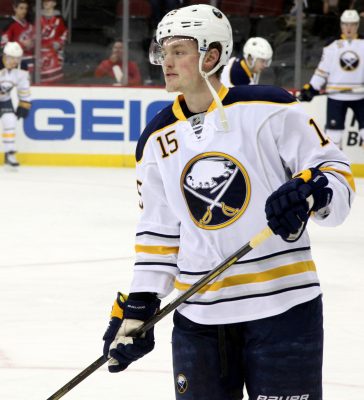
A narrative that seems to inch its way into the hockey discussion each year is the ever-growing American presence. That narrative is yet to stall, due to the NCAA’s development as one of the primary paths to professional hockey.
NHL drafts have included an average of 60 or more collegiate players in the last 13 seasons, a giant leap from when it was primarily a Canadian league. In 2000, just 20 percent of the league had formerly played in college; by 2014, it was 31 percent, an all-time high.
Junior hockey in Canada opened its doors to European players, cutting down ice-time and slowing down the development of several Canadian players. The collegiate level continues to produce talent that comes from the USHL, U.S. National Under-18 Team and other development programs to prepare players for the professional game.
Since 2008, nearly 36 percent of NHL rookies once played collegiately. The list of current NHL stars who played at the NCAA level include Boston University’s own Jack Eichel, Jonathan Quick, Johnny Gaudreau, Ryan Kesler, David Backes, Jonathan Toews, Zach Parise and many more.
While American players have seen their NHL prospects soar, players from other countries are seeing the opposite.
More Europeans are playing in Canada than ever before, and they’re playing a quicker style of play. Not only is this taking roster spots away from Canadian players, but Europe is also losing some of its best players.
Additionally, more European athletes are beginning to play at the college level. BU is an example of this with sophomore forwards Oskar Andrén and Jakob Forsbacka Karlsson coming from Sweden. University of North Dakota and the American International College have also received an influx of European talent.
European talent began to infiltrate professional hockey in the 1990s, but has not burst onto the college scene until recently. This change has already affected Canada, which has seen some aspects of its national team struggle, such as developing its goaltenders. If European talent continues to flock to the United States to play collegiately, that could also begin to affect the number of American players in the NHL.
It could be fair to assume that American hockey is at an all-time high as far as talent goes, as evidenced by Team USA’s skill at the third installment of the World Cup of Hockey in September. Though the team had an early exit, the Americans left a lot of talent at home and competed without some of its top scorers.
This shift may just be the beginning of some of the changes the NHL may face in the coming years. The American population in the NHL is up, but could that recede if many Europeans continue to play? What about Canadians? Is playing in the NCAA also an option for them with less roster spots available in junior hockey?
It may be a few years before we know these answers, but the landscape is changing, and that’s indisputable. If Canada is any indication, within the decade we could see the United States program change drastically.
The collegiate game is becoming the preferred choice to make it to the NHL, despite the likes of Auston Matthews choosing to bypass college to play in in Europe. The top talent is mostly choosing the NCAA, and that could mean a U.S. influx soon. This might change if Europeans continue to vie for roster spots, though.
One way or another, the talent in professional hockey is only getting better, and it doesn’t really matter where it comes from. As fans, all we should care about at the end of the day is the on-ice product.





















































































































